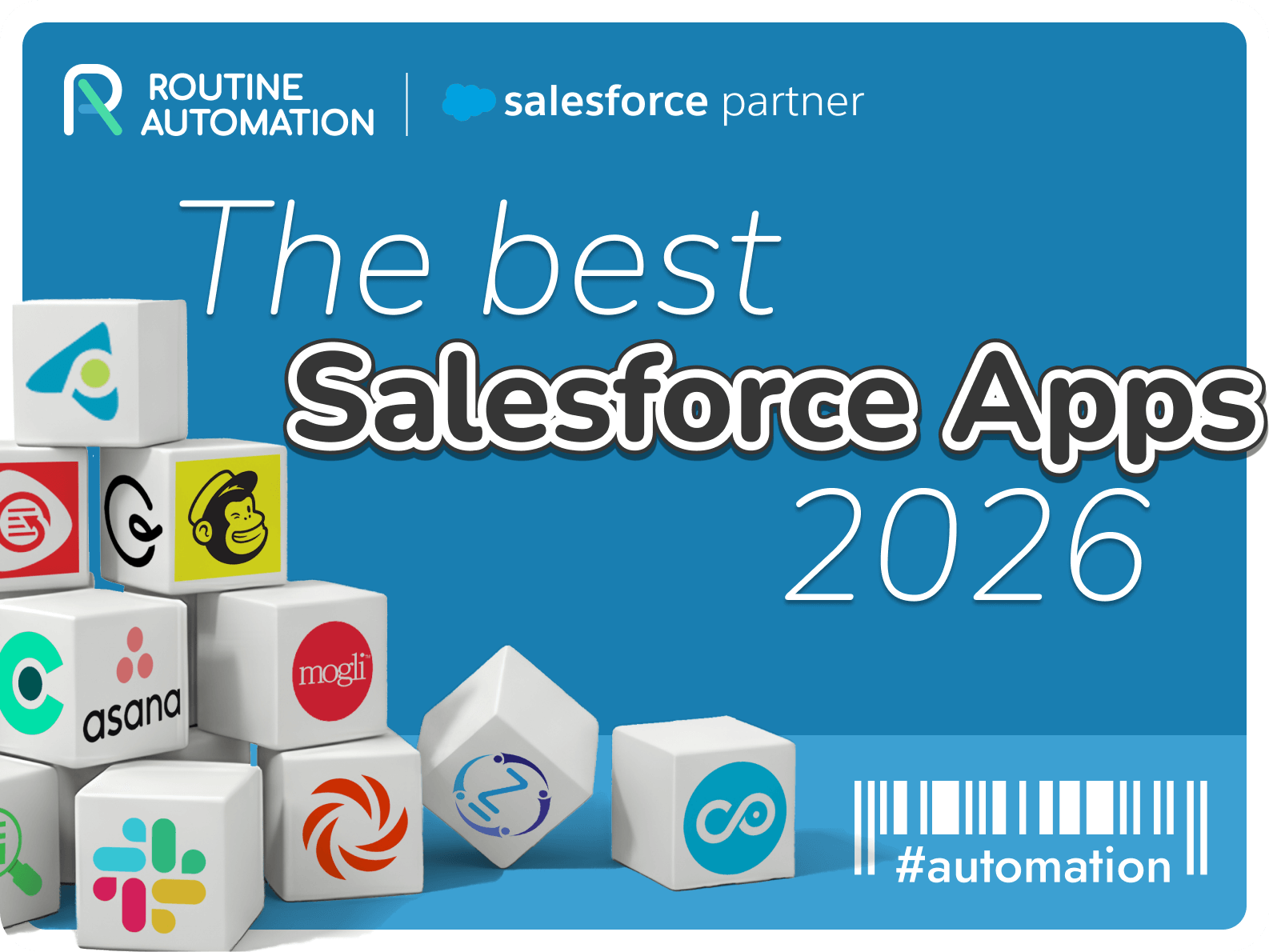Salesforce Commerce Cloud vs Shopify: Full Comparison Guide
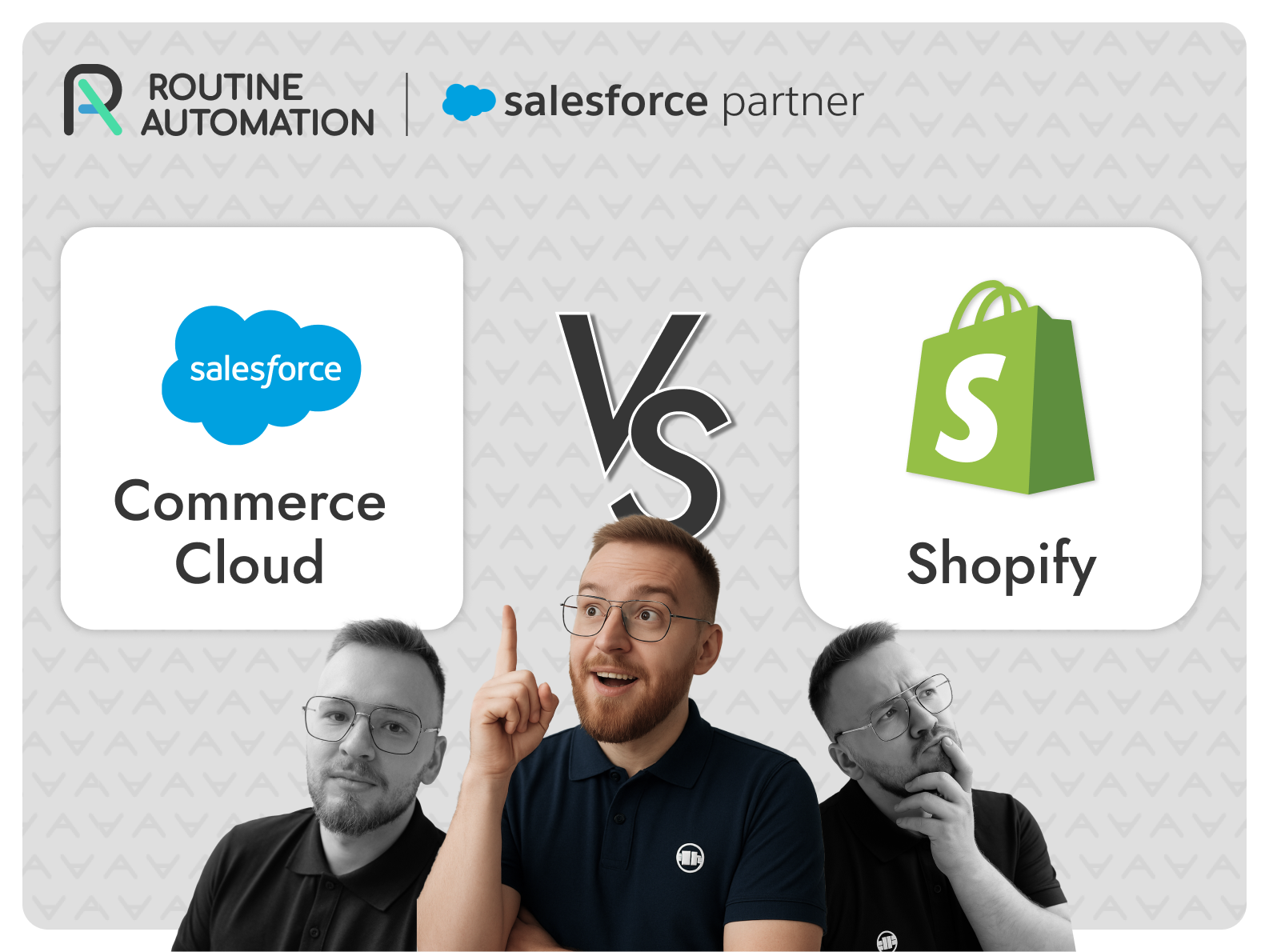
Not that long ago, building online stores was all about layouts and product photos. Now it’s just as much about data, automation, and how shoppers actually feel when they land on your page. The platform you choose does more than host your store – it decides how your business grows and how it stands out.
That’s why people keep talking about Salesforce Commerce Cloud vs Shopify. They both lead the market, but they don’t play the same game.
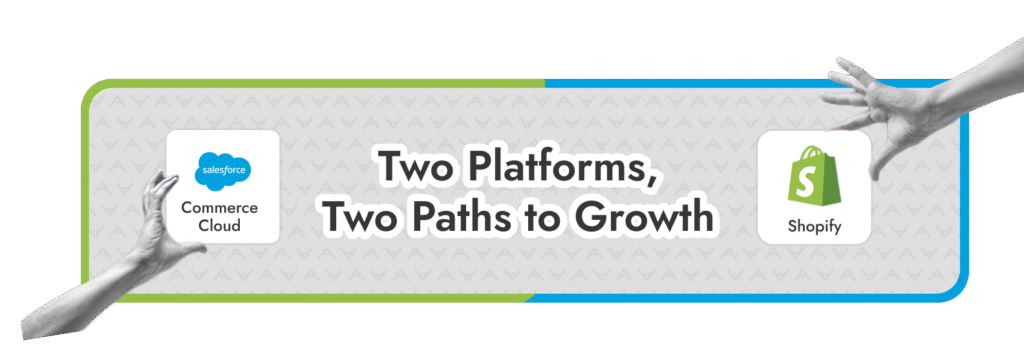
Shopify leans on speed and simplicity, the kind of setup a small team can turn into a live store before Monday morning. Salesforce Commerce Cloud is the opposite: it thrives in complexity, connecting products, data, and customer behavior under one intelligent system.
Shopify’s reach is undeniable. It powers over 9.55 million stores. Salesforce Commerce Cloud, hosts about 5,700 enterprise stores worldwide, but sits behind some of the most sophisticated retail operations on the planet.
This article isn’t a surface-level Salesforce commerce cloud vs Shopify comparison. It’s a look at how each platform thinks about growth, how their ecosystems differ, and what that means for the people building stores today, whether you’re launching from scratch or wondering if it’s time to move from Salesforce commerce cloud to Shopify.
Understanding Shopify
Shopify made online selling feel simple again. What used to take a team of developers and a long checklist suddenly turned into something anyone could handle.
You open an account, click through a few steps, and you’re live. No waiting on IT, no wrestling with servers. Everything runs quietly in the background -payments, shipping, updates, all of it. Over time, the platform grew into a huge library of apps and themes, so even small teams could test new ideas without coding.
Bigger companies move to Shopify Plus for the same simplicity with more power behind it, things like automation and better APIs. That balance of ease and control is what makes it such a common comparison to Salesforce Commerce Cloud.
Accessibility is the strength of Shopify. It’s fast to deploy, easy to run, and flexible enough to grow with a business. For teams focused on getting products to market quickly and refining them as they go, that matters more than complexity ever could.
Exploring Salesforce Commerce Cloud
Salesforce Commerce Cloud plays a different game. It isn’t chasing fast launches. It’s built for endurance – a platform meant to link every piece of the buying experience, from browsing to loyalty, under one system.
It started life as Demandware, long before Salesforce acquired it, and that history still shows. The platform was built for scale, for retailers managing thousands of products, regions, and customer segments all at once. Where Shopify streamlines, Salesforce connects. Every order, every cart, every click ties back into the same data model that powers its CRM, marketing, and service tools.
That deep link between commerce and CRM is its defining trait. Each purchase becomes more than a sale; it updates customer records, triggers workflows, and refines future campaigns. For teams already using Salesforce, eCommerce folds naturally into the wider ecosystem instead of sitting apart from it.
The trade-off is complexity. Salesforce Commerce Cloud takes longer to implement and needs more technical care, but in return, it offers precision, the kind that global brands like Adidas, L’Oréal, and Puma depend on to run multi-site, multi-language storefronts.
That number of stores running on Salesforce for manufacturing, energy, and retail companies might sound modest next to Shopify’s reach, but the scale behind each of those stores tells a different story: high-volume operations, complex logistics, and deeply personalized buying experiences.
For enterprise teams, this isn’t just an eCommerce solution. It’s part of a larger data strategy, one that treats every sale as another piece of the customer puzzle.

Salesforce’s B2B Commerce Cloud brings every part of online selling into one place, data, customers, and operations working from the same source of truth. If that sounds like the next step for your business, it’s worth seeing what connected commerce can actually look like in practice.
Shopify Enterprise vs Salesforce Commerce Cloud Features
Both Salesforce Commerce cloud and Shopify can support enterprise brands. They can even work together, if you know how to master Shopify and Salesforce integration. But there’s a big difference between the features you get out of the box.
Here’s what you really need to consider in your Salesforce commerce cloud, Shopify Plus comparison:
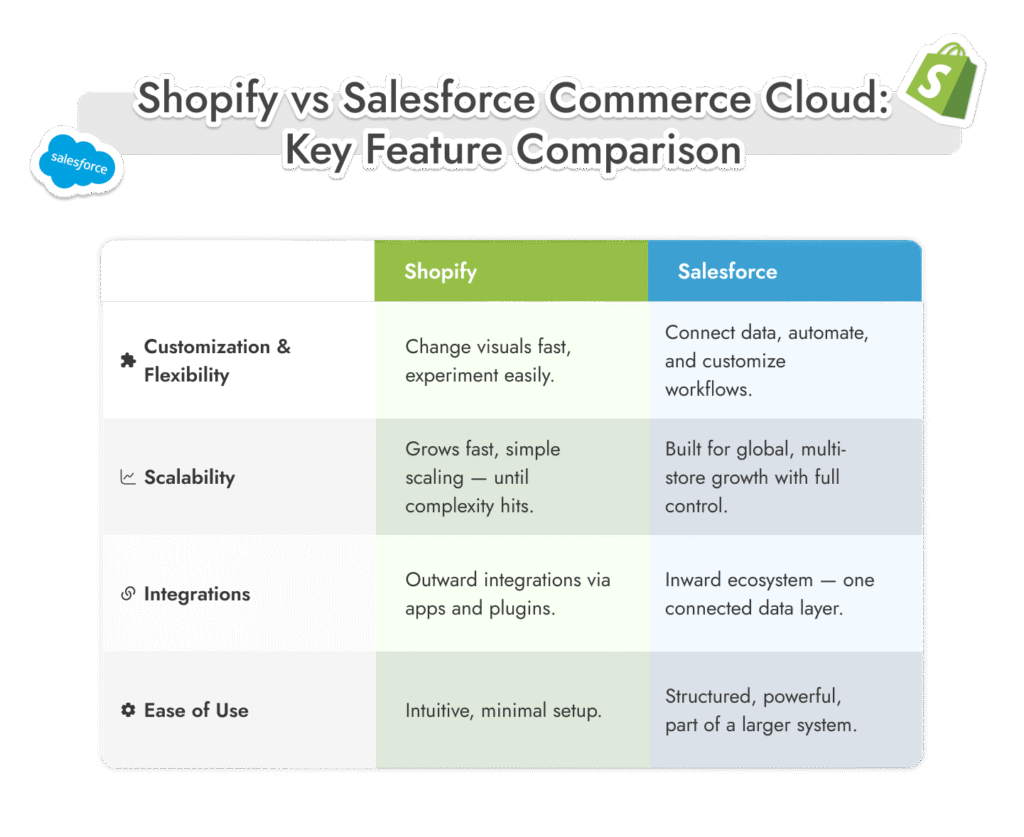
Customization and Flexibility
Flexibility means different things depending on where you sit. A small retail team might define it as being able to change a homepage banner before a weekend sale. A global brand sees it as controlling how product data flows between regions, currencies, and fulfillment systems. Both are valid, but they need very different tools.
Shopify was built around the first idea. It gives you what most companies want on day one: a clean starting point that you can adjust without a developer. Themes handle design. The Shopify App Store fills in the gaps with thousands of extensions. The interface is visual and forgiving; you can try things, roll them back, and keep moving. It’s a system made for momentum.
Salesforce B2B Commerce Cloud treats flexibility as something deeper than design. It starts with the idea that your business is already complex. You’re not just changing themes; you’re shaping how everything links together. Its API-focused framework lets developers connect ERPs, create regional storefronts, and automate data across systems.
You can modify pricing, automate workflows, or stream customer insights directly into Salesforce CRM for personalized experiences. That kind of freedom needs planning and solid governance, but for global enterprises juggling multiple models and markets, that control is exactly what makes it worth it.
Shopify vs Salesforce: Scalability
Growth never arrives neatly. Sometimes it comes slowly, a few more customers each week. Sometimes it hits like a wave: a product takes off, or a campaign goes better than anyone expected. What happens next usually depends less on marketing and more on what your platform can handle.
Shopify’s strength is that you don’t really have to think about it. The system scales quietly in the background. Whether you’re running a weekend flash sale or suddenly doubling your traffic, it just works. There’s comfort in that, especially for smaller teams without an IT department to call when things get busy. You can add products, open new channels, even spin up additional stores with almost no friction.
But every shortcut hides a ceiling. The moment your business starts to stretch beyond a single site or market, that same simplicity becomes a limitation. Multi-store setups, regional pricing, complex inventory rules, you can do all of it, but it starts to rely on plugins and external apps to keep everything in sync.
Salesforce Commerce Cloud takes a different view. It’s built for growth that’s planned, not accidental. The platform expects complexity, multiple storefronts, languages, and catalogs, all running under the same structure. There are even solutions for B2B companies using Salesforce for energy, or logistics. Scaling here means connecting everything: sales, marketing, service, and analytics. That connection is what makes it powerful. A spike in one region can inform decisions in another. A shift in behavior feeds back into product data automatically.
It’s not effortless. Implementation takes time, and scaling takes coordination. But the trade-off is stability, a system that can grow wide, not just tall.
When people compare Salesforce commerce cloud to Shopify, this is usually the heart of it. Shopify gives you freedom to move fast. Salesforce gives you the space to build something that lasts.
Feature Comparison: Integrations
This is a big point for those looking at Shopify vs Salesforce commerce cloud.
The tools behind your store rarely stand alone. A strong platform doesn’t try to handle everything; it helps everything else work together. That’s where the biggest contrast between Shopify Plus and Salesforce Commerce Cloud appears. Shopify’s App Store gives smaller teams big capabilities, from automating fulfillment to tracking analytics. For many, it’s more than enough. But as operations expand, scattered data can become an issue. One plugin manages stock, another runs marketing, while insights live somewhere else. Shopify’s variety can feel fragmented once you reach enterprise scale.
Salesforce Commerce Cloud approaches integrations from a different angle. It isn’t about adding tools; it’s about unifying them. Everything connects through the Salesforce ecosystem: sales, marketing, service, analytics, even Salesforce for logistics, and it all shares the same data layer. When a customer buys, that event doesn’t just update a dashboard. It informs how the marketing team segments audiences, how support prepares for follow-up, and how sales approaches retention.
That level of connection is what makes Salesforce so appealing for enterprise teams. It takes longer to set up, and you’ll likely need technical support along the way, but once it’s in place, it changes how your business runs.
In a Salesforce commerce cloud vs Shopify comparison, this is where the philosophies diverge most clearly. Shopify integrates outward, quick links to everything around it. Salesforce integrates inward, a single system where every part knows what the other is doing. Both work. The question is whether you want to connect more apps or connect more meaning.
Shopify vs Salesforce: Ease of Use
What people love most about Shopify is how easy it feels. You log in and just start building; the layout makes sense right away. Most folks can add products and start selling before the day’s out.
That ease comes with boundaries. The platform is simple because it’s controlled. You can change what’s meant to be changed: colors, layouts, content, but going beyond that often means using plugins or custom development. For many, that’s an acceptable trade: less power in exchange for less friction.
Salesforce Commerce Cloud, on the other hand, doesn’t pretend to be simple. It’s powerful, but it expects a level of structure. Setting up a store takes more time. So does training.
But once it’s running, it fits into a much larger picture: sales, marketing, service, analytics, all connected through one environment. For teams already using Salesforce, that familiarity helps. The tools speak the same language.
Shopify Enterprise vs Salesforce Commerce Cloud Pricing Comparison
Money is usually the easy part, until it isn’t. Most platforms promise transparency, and in a sense, they deliver. But what you pay each month rarely tells the full story.
Shopify keeps things simple. Choose a plan, pay the fee, and your store goes live. Hosting, security, and maintenance come included. For small teams, that predictability is a huge benefit. The extra costs come later, as added features often live behind apps – automation, reporting, loyalty tools, and more. Each seems small but together they can build up quickly. It’s not a trick, just the natural cost of flexibility. Shopify runs the platform; you shape the ecosystem around it.
Salesforce Commerce Cloud comes at pricing differently. Instead of a flat subscription, you pay a percentage of your total sales. It ties cost to performance, which sounds fair, and often is, but it also means planning is harder. A good quarter means a higher bill. A quiet one, a lower one.
Setup is heavier too. Salesforce isn’t a plug-and-play system; you’ll need development and maintenance to get it right. But that cost also replaces a lot of what Shopify leaves to third parties: your CRM, marketing automation, analytics. Everything runs under one roof.
So the comparison isn’t really about which is cheaper. Shopify costs less to start, but more to extend. Salesforce costs more to build, but gives you the long view. The right answer depends on whether you’re budgeting for launch, or for scale.
Pros and Cons of Each Platform
Shopify and Salesforce Commerce Cloud are both good at what they do. The real challenge is that they do very different things well. What feels like a strength for one can easily become a limitation for the other, depending on how your business grows.
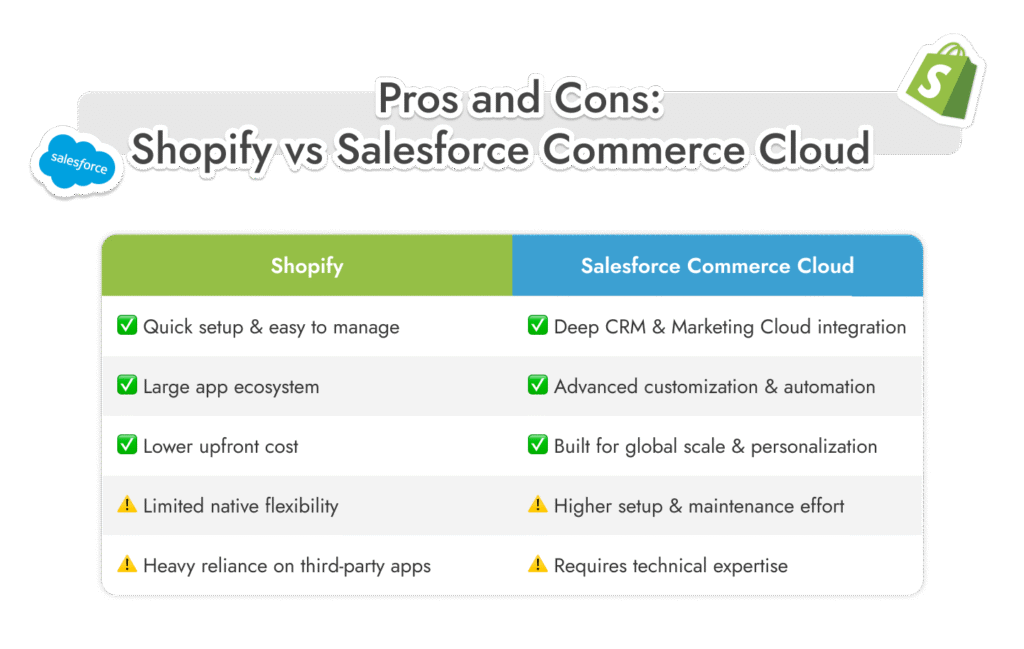
Shopify: Pros and Cons
Salesforce Commerce Cloud: Pros and Cons
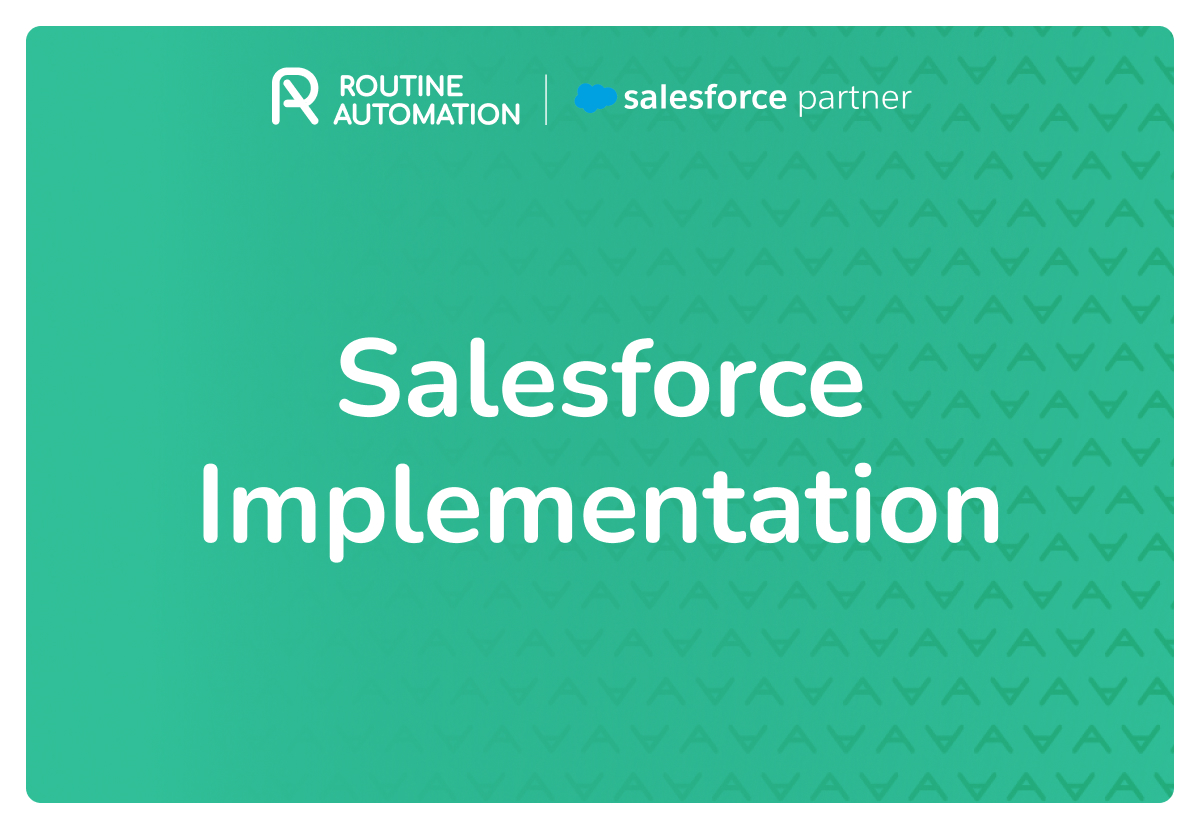
Picking from Salesforce Commerce Cloud vs Shopify isn’t about features it’s about how you want your business to run. Our Salesforce consultants help companies plan, design, and implement systems that fit, not just function.
When to Choose Each Platform
Every platform sounds perfect on paper. The real picture only shows up when you stack it against your day-to-day. The right choice depends on how your business actually runs – how technical your team is, how much time you’ve got, and how fast you need to move.
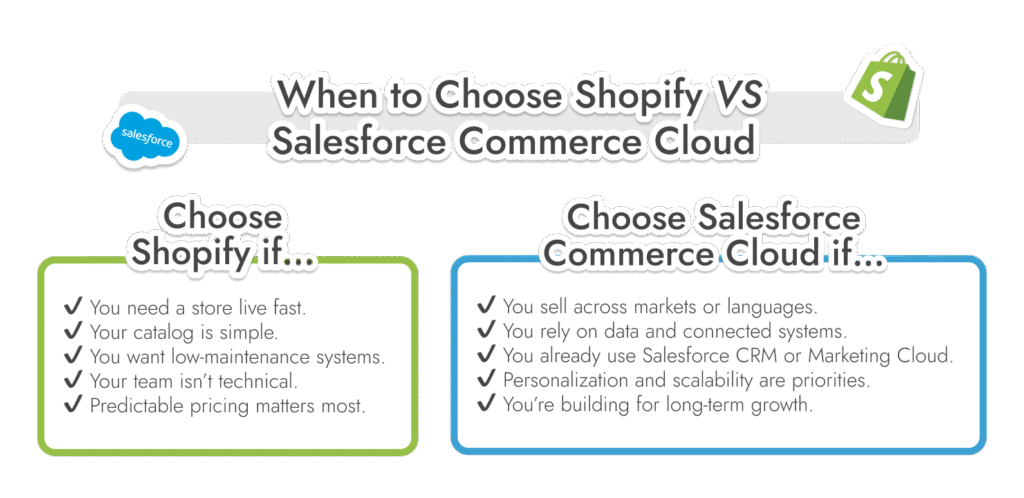
Choose Shopify if:
Choose Salesforce Commerce Cloud if:
Both can deliver remarkable results. The difference is in where you are and where you’re going. Shopify gives you speed and a clean foundation that gets you moving. Salesforce Commerce Cloud gives you reach and the ability to scale in every direction without starting over.
Comparison Table: Shopify vs Salesforce Commerce Cloud
By now you can probably see how different Shopify and Salesforce Commerce Cloud really are. Still, it helps to line them up side by side. This quick look shows where each platform shines in the areas that usually matter most.
|
Feature |
Shopify |
Salesforce Commerce Cloud |
|---|---|---|
|
Customization |
You can do quite a lot without code. Themes, product layouts, discounts, all easy. Anything beyond that, you’re probably in app territory. |
Everything’s possible, but it takes setup. You can customize how products, data, and automation work together. |
|
Integrations |
There’s an app for almost everything. Great until you have too many. Data ends up everywhere. |
Built to connect everything inside Salesforce – CRM, Marketing Cloud, analytics. |
|
Scalability |
Grows fast, handles traffic well. Perfect for online brands moving quickly. |
Made for scale. Handles global stores, languages, currencies, and data from the same dashboard. |
|
Ease of Use |
Very user-friendly. You can figure it out in a day or two. Most updates don’t need help. |
Takes longer to learn. Once it’s set up, it’s smooth, but early on you’ll need support. |
|
Pricing Model |
Monthly subscription plus app costs. Simple to start, adds up over time. |
Based on sales volume. Higher entry cost but often replaces other systems, so it balances out. |
|
B2B/B2C Support |
Great for direct-to-consumer. B2B is doable with Shopify Plus, but not native. |
Handles both easily. Account-based pricing, bulk orders, roles – all built in. |
|
Internationalization |
Can sell globally with plugins. Works fine but feels pieced together. |
Native multilingual and multi-currency tools. Strong for international operations. |
|
CRM & Marketing Integration |
Needs third-party tools like HubSpot or Klaviyo. They work, but it’s still multiple systems. |
Fully integrated with Salesforce CRM and Marketing Cloud. Everyone works from the same data. |
|
Time to Launch |
Days, maybe a week for bigger stores. That’s its magic. |
Longer project – often a few months. More planning, more setup, more future-proof. |
|
Developer Dependency |
You can run it mostly yourself. Dev help is optional. |
Needs technical input, especially early. Once configured, it’s stable and scalable. |
Salesforce Commerce Cloud vs Shopify Enterprise: Final Thoughts
Picking from Salesforce Commerce Cloud and Shopify isn’t really about software. It’s about how your business works, and what kind of future you’re building toward.
Shopify gives you a head start. You can open a store in a day, test ideas, adjust your approach, and move fast without a technical team behind you. It’s light and steady, which is exactly what many growing brands need.
Salesforce Commerce Cloud takes a different path. It’s slower at the beginning, but deliberate. It’s for companies that want every sale, every service ticket, and every marketing touchpoint to feed into the same system. That structure makes it heavier to lift, but stronger once it’s standing.
The question behind a Salesforce commerce cloud vs Shopify enterprise comparison isn’t which platform wins, it’s which one fits the way you already work. If you live in spreadsheets and quick launches, Shopify will keep you agile. If your business runs on data, departments, and process, Salesforce will give you the foundation to keep all of it connected.
FAQs







